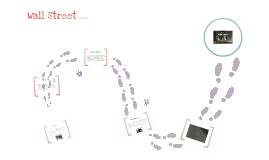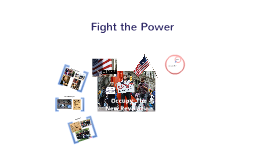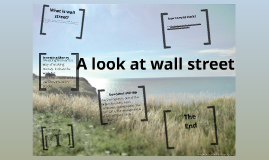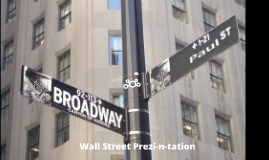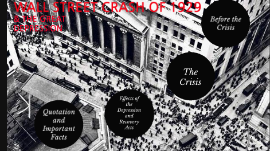Wall Street Presentation
Transcript: Wall Street The Wall Street Way! When was Wall Street Constructed? When was Wall Street Constructed? Wall Street was constructed on March 8, 1817. The name of the stre... Wall Street was constructed on March 8, 1817. The name of the street originates from an actual wall that was built in the 17th century by the Dutch. The area near the wall became known as Wall Street. Due to its prime location running the width of Manhattan between the East River and the Hudson River the road developed into one of the busiest trading areas in the entire city. The financial industry got its official start on Wall Street on May 17, 1792. On that day, New York's first official stock exchange was established by the signing of the Buttonwood Agreement. The Buttonwood Agreement was the document that gave birth to what is now the modern-day New York Stock Exchange or NYSE for short. The financial industry got its official start on Wall Street on M... Wall Street Crash of 1929: The Wall Street Crash of 1929 was the greatest stock market crash in the history of the United States. It happened in the New York Stock Exchange on Tuesday October 29, 1929, now known as Black Tuesday. The crash started the Great Depression and stock prices did not reach the same level until late 1954. Wall Street Crash of 1929: The Benefits of Wall Street The Benefits of Wall Street Benefits Benefits -Without Wall Street there would be no middle class, meaning if you were apart of the higher class you'd remain in that class and if you were poor you would remain in the lower class. -Wall street also supports both sides of the economy, meaning those who are seeking to invest into stocks or those seeking to borrow What exactly is Wall Street's purpose? What exactly is Wall Street's purpose? The term 'Wall Street' is used as a modern or familar term that cove... The term 'Wall Street' is used as a modern or familar term that covers the financial and investment community, including stock exchanges and large banks, brokerages, securities and underwriting firms, and big businesses. Why is Wall Street So Important? Wall Street, is not only a physical place, but it is also a virtual world that serves three purposes: 1. Wall Street makes capitalism work through making the primary market a common ground for those looking to not only save capital, but to raise it too. This is done generally either through the issuance of bonds or selling shares of a business to a stockholder. 2. Wall Street also serves as a networking for people that are interested in selling or buying bonds and stocks. 3. Wall Street also influences consumer confidence because often the economy is growing which makes the consumers more likely to spend money. Why is Wall Street So Important? Henry Paulson: Chairman and CEO, Goldman Sachs John Thain: CEO, NYSE Group Jamie Dimon: CEO, JPMorgan Chase Stanley O'Neal: CEO and president, Merrill Lynch Larry Fink: Chairman and CEO, BlackRock Carl Icahn: Founder, Icahn Partners Steven Cohen: Chairman and CEO, SAC Capital Important People In Wall Street Jordan Belfort: Belfort is often known as the "Wolf of Wall Street" because in 1999, he pleaded guilty to fraud and related crimes in connection with stock-market manipulation and running a boiler room as part of a penny-stock scam. Infamous Person in Wall Street: Fun Fact ! Fun Fact ! Is The Wall Street We Know Today, The Only Wall Street There Ever Was? NO!






